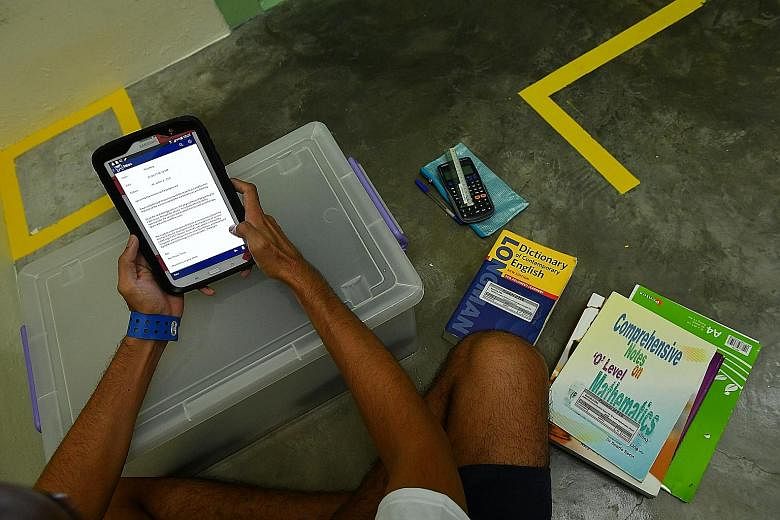Every day after dinner, Ishak (not his real name) uses a tablet to read and write letters to his family, catch up on the news and study for his upcoming O levels.
In between revising, he plays a few mini games pre-installed on the tablet or reads an e-book.
Such a routine is now possible for the 34-year-old, who is serving 20 years behind bars for drug trafficking.
He is one of about 800 inmates here, across four prison institutions, who can now access a suite of mobile applications on shared tablets as part of a six-month trial by the Singapore Prison Service (SPS).
SPS is moving towards becoming "prisons without guards", where leveraging technology to automate routine work processes and deliver differentiated rehabilitation to inmates is key.
The tablets are connected to a secure internal network and can be used by inmates in their cells. Three to four inmates are issued one tablet to share for a few hours each day.
By 2019, all inmates should have access to these tablets, said Superintendent of Prisons Seu Mun Chung, SPS' assistant director of technology development.
He added that feedback will be gathered from inmates and prison officers when the trial ends in September.
Ishak, who has spent eight years behind bars, told The Straits Times during an exclusive visit to Tanah Merah Prison, that electronic access to his letters means he hears from his family more frequently.
"At first, I couldn't believe that I was allowed to use a tablet... Previously, with hard copy letters, my family members would need to have some free time to sit down and write to me. But now, they can send letters to me using their phones, on the bus, while they are going to work," he said.
Sending and receiving e-letters takes only about four days, while handwritten ones could take several weeks, he added.
E-letters are digitally screened by prison officers using a content search function before they go to the inmates' accounts with a click of a button. With physical letters, officers at the housing units have to read through each letter and manually sort them out according to the inmates' locations.
Inmates are allowed to send four letters a month and each e-letter can take up to 20,000 characters.
Besides getting updates on his family, Ishak can also easily write to former inmates, who are a source of motivation and guidance.
"They give me a lot of advice. If I need to know what's 'in' for education outside or about the current job market, I can just ask them," he said, adding that he hopes to pursue a career in psychology or counselling.
Former offender Sunny Swee, 36, recalled how he would communicate with friends and relatives through snail mail. "Many inmates don't have experience writing e-mails. Learning how to be comfortable with technology is powerful for them, especially when they are looking for a job after coming out of prison," he said.
"Many of them also want to know the kind of challenges we face when we are released and how they can cope," added Mr Swee, who is now studying at Nanyang Technological University.
Besides reading letters, the tablet allows inmates to catch up on current affairs. To get ideas for his English essays as preparation for his O levels, Ishak uses the e-news app for about 45 minutes each day.
He can also read one of the 600 e-books available on the tablet, instead of waiting to visit the prison library escorted by prison officers.
Deputy Superintendent of Prisons Clifford Lin, an officer in charge of a housing unit at Tanah Merah Prison, said that going electronic has cut down "manual and tedious processes", such as the screening, sorting and distribution of hard-copy letters and newspapers.
"It helps to free up an officer's time to focus on higher value work, such as engaging with the inmates and helping them with their rehabilitation," he said.
Soon, inmates in the trial will be able to listen to daily podcasts created by the prison's in-house psychologists, Supt Seu said.
The podcasts will include motivational messages and tips on coping with stress, for example.
Eventually, all inmates will be able to access self-learning educational materials, such as Workforce Skills Qualifications and literacy programmes.
Said DSP Lin: "It stretches the hours that they can be engaged meaningfully, even when they are in their cells. Now, we can reach out to hundreds of inmates at one time."
VIDEO
A look at the tablet. http://str.sg/4aMY


